What are the guidelines for preparing the "Quang Trung đại phá quân Thanh" lesson for 8th-grade students in Vietnam?
What are the guidelines for preparing the "Quang Trung đại phá quân Thanh" lesson for 8th-grade students in Vietnam?
Below are guidelines for preparing the "Quang Trung đại phá quân Thanh" lesson for 8th-grade students in Vietnam:
Sample 1: Summary of the text "Quang Trung đại phá quân Thanh"
The text recounts the event where King Quang Trung (Nguyen Hue) led the Tay Son insurgent army to defeat the Qing army in 1789. Upon hearing the news of the Qing invasion, Quang Trung quickly organized a march to the North. Along the way, he motivated his generals and soldiers, boosting their fighting spirit. On the eve of the Lunar New Year, the insurgent army unexpectedly attacked Ha Hoi garrison, causing panic among the enemy. On the morning of the fifth day of the Lunar New Year, the decisive battle took place at Ngoc Hoi – Dong Da, resulting in a resounding victory for the Tay Son army and a major defeat for the Qing army. King Quang Trung marched into Thang Long, liberated the country, showcasing the intelligence, courage, and patriotism of the national hero.
Sample 2: Analysis of Quang Trung as a character in "Quang Trung đại phá quân Thanh"
In the text "Quang Trung đại phá quân Thanh", King Quang Trung emerges as a talented, brave, and decisive general. He not only demonstrated strategic vision by swiftly moving his troops but was also excellent at encouraging the soldiers’ morale. He devised a clear battle plan, strategically divided the army, and executed surprise attacks that left the Qing army unprepared. His bold yet meticulous strategies illustrate outstanding military prowess. As a result, within a short period, King Quang Trung thwarted the Qing's invasion plot, firmly safeguarding the nation's independence. Through this lesson, I have even more admiration and pride for this heroic figure.
Sample 3: Historical Significance of the Ngoc Hoi – Dong Da Victory
The victory at Ngoc Hoi – Dong Da in 1789 is not only a major military event but also holds deep historical significance. Firstly, it reflects the patriotism and resilient fighting spirit of our nation. Under the leadership of King Quang Trung, the Tay Son insurgent army quickly crushed the Qing's invasion plot, maintaining our nation's independence. Secondly, this victory affirmed Quang Trung’s exceptional military talent, as he led a rapid assault that left the enemy unable to defend. Through this lesson, I feel pride and gratitude for the heroes who sacrificed for the country, and I draw lessons on unity and determination in defending national sovereignty.
Sample 4: Quang Trung's Fighting Spirit and Strategy
King Quang Trung was a brilliant military leader with extremely intelligent tactical strategies. Upon hearing of the Qing invasion, he did not waver but immediately mobilized his troops, recruiting more forces while advancing. He skillfully motivated his generals and soldiers, instilling in them a spirit of determination to win. While advancing to the North, he divided his forces strategically, attacking the Ha Hoi outpost first to weaken the Qing army's morale. Subsequently, the decisive battle at Ngoc Hoi – Dong Da transpired swiftly and unexpectedly, terrifying and scattering the enemy. Thanks to his intelligence, decisiveness, and sharp tactics, King Quang Trung achieved one of the greatest victories in our nation's history.
The information provided is for reference only!

What are the guidelines for preparing the "Quang Trung đại phá quân Thanh" lesson for 8th-grade students in Vietnam? (Image from the Internet)
What are the assessment requirements for 8th-grade students in Vietnam?
According to Article 4 of Circular 22/2021/TT-BGDDT, the four assessment requirements for 8th-grade students in Vietnam include:
- Conduct assessment based on requirements under formal education program.
- Conduct assessment while ensuring accuracy, integrity, fairness, honesty, and objectivity.
- Conduct assessment via multiple methods, forms, techniques, and tools; combine regular assessment and periodic assessment.
- Conduct assessment for student’s improvement; prioritize motivating and encouraging efforts of students in training and learning; do not compare students with one another.
What are the required outcomes regarding speaking and listening skills in the 8th-grade Literature curriculum in Vietnam?
According to the General Education Program in Literature issued with Circular 32/2018/TT-BGDDT, the required outcomes regarding speaking and listening skills in the 8th-grade Literature curriculum in Vietnam are as follows:
Speaking
- Present an opinion on a social issue; state clearly the opinion and arguments; use convincing reasons and evidence (information technology can be used to enhance the presentation).
- Know how to give a brief introduction about a book (of personal choice): provide readers with the most important information; state the topic or theme of the book and some distinctive artistic features.
Listening
- Listen and summarize the content of another's presentation.
- Grasp the main content discussed by the group and be able to present that content.
Interactive Speaking and Listening
- Know how to discuss opinions on a life issue appropriate for the age.

